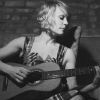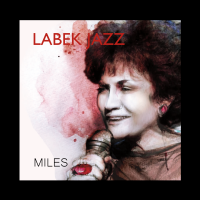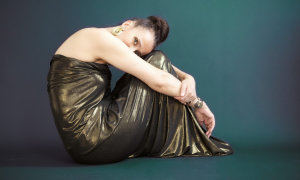Home » Jazz Articles » Interview » Jo Lawry: Singing Sideman
Jo Lawry: Singing Sideman
I suppose my dream job is as a sideman, because I love to be in somebody else's project, and for my job to be making their music sound great.
 Australian vocalist Jo Lawry is quickly establishing herself among the top tier of current jazz vocalists. And she's doing it—at least some of the time—by being a sideman.
Australian vocalist Jo Lawry is quickly establishing herself among the top tier of current jazz vocalists. And she's doing it—at least some of the time—by being a sideman. Lawry hails from Adelaide, Australia. She's been in the U.S. for several years now pursuing advanced degrees in jazz, but she hasn't spent all her time studying. She's also managed to collect an impressive list of resume credits as a performer, including performing and recording with Kate McGarry, Fred Hersch, Donny McCaslin and others.
Lawry's debut album, I Want To Be Happy (Fleurieu, 2008), features original compositions and creatively reworked tunes from the jazz and pop songbooks. Lawry stands out from the pack because of her clear melodic and harmonic ideas and her incredible intonation.
All About Jazz: Tell me about the song "Small House."
Jo Lawry: That was actually written as somewhat of an apology to my lovely partner in music and life and living, vibraphonist James Shipp, who's on the record. I'm in the midst of doing my doctorate at the moment, so study is pretty hectic. Trying to do that in a basement studio with 6-foot ceilings, living with a percussionist who's constantly playing and has a million drums, is a tough task.
One day I just completely lost it and said, "You've got to get out. I've got to study. I don't care where you go or what you do, just get out of the house." I was not very nice about it. I kicked him out for the day, and I felt so bad about the way I'd done it that I started writing this little tune. It's just all about how the quarters are close and it can be a challenge, but that it works out nicely when you're with someone you love.
The funny thing is that he came back and I thought he'd think this was such a sweet song and such a lovely apology. But he was just so cross that I wasn't studying. He said, "I've been driving around, staying out of the house, and you wrote a song? You're supposed to be writing a paper."
AAJ: What's the jazz scene like in Adelaide, Australia?
JL: It's really great. There are a lot of fantastic musicians there. It's a smallish place. It's a really wonderful place to live. Lots of great musicians come from Australia. In fact, the bassist on my record, Matt Clohesy, is from Australia. And also Barney McAll, who is on keyboards on the record. Great musicians. When I was there, though, I was playing mostly weddings and doing private teaching, so this is a really different scenario here. I love going back to play, but for now I'm definitely based in New York and loving it.
AAJ: When did you start singing, and when did you realize it was something you were serious about?
JL: It's that clichéd story of singing at the same time as learning to talk. When I was very young, about 8 or 9, I started doing gigs in churches. I come from a church family, so I was singing in churches. Then when I was 12, my mom took me to an audition for Les Miserables and I got in. I was sure that what I wanted to do for the rest of my life was to be in musicals, and that was the plan for a little while.
Then I went overseas on a trip with World Vision and decided I wanted to be a doctor. I abandoned singing for a while, but then decided it was what I really wanted to do. I did a little bit of classical study because that seemed like the legitimate thing to do out of high school, but it didn't really have the freedom or resonate with me in the way that jazz does. My brother is a huge jazz fan and I was listening to a lot of his records. I switched into the jazz program and from there it just progressed. 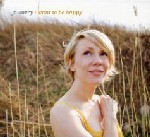 AAJ: When did you decide to come to the United States?
AAJ: When did you decide to come to the United States?
JL: I made the decision to come to the States when I decided to do my master's. At that time in Australia, they weren't really set up to do that. My intention had been to do my master's and then go back home to Australia to continue my teaching job in the university, because I'd been teaching there. I got a Fulbright Scholarship to come and study here, and it's just been too hard to leave. Now I'm doing my doctorate in jazz performance at New England Conservatory and living in New York and commuting between Boston and New York. It's quite a hectic lifestyle.
AAJ: With whom are you studying at NEC?
JL: At the moment, I'm studying with Danilo Pérez, which is really wonderful. I've also been fortunate to study with Dominique Eade and Jerry Bergonzi and John McNeil.
AAJ: How are you incorporating what you're learning? What differences do you hear in your songwriting or performing?
JL: I'm the only jazz major in my year in the doctoral program. It's a very small program, and the rest of the musicians are classical musicians. So the academic side of it, in fact most of it, is really coming from the classical perspective. So I'm being exposed to all sorts of music that, frankly, I dodged for so many years.
Now I'm exposed to it whether I like it or not. But it's been really wonderful. I've been trying to do some jazz arrangements of some [Felicien] Foret and a few different composers that I'd always loved. Now I'm seeing I have a right to be involved with them. I'm trying to incorporate that into my playing and arranging and writing.
Danilo is a wonderful teacher who is forcing me to write and write and write. That's been a big change. I've always been an arranger. I always feel more comfortable working with preexisting material and putting my own sound into it. Working with a blank canvas is really intimidating to me. When I see all that silence and wonder how to fill it or not to fill it. But he's making me feel more comfortable. Every week he says, "Bring me a new tune. I don't care what it sounds like, but it's got to be new."
AAJ: Why is it important to you to undertake an academic study of the music?
JL: There are a lot of practical factors involved in me choosing to do a doctorate. It probably isn't something I would have chosen to do just from a musical perspective. But I love to teach. I really, really do. I always expect that that's going to be a fairly important part of what I do, regardless of what kind of success I'm fortunate enough to have as a performer. So the doctorate is going to help with that.
It's also exposed to me to a different way of thinking and to approaching art from lots of different levels. One of the really exciting things has been to widen my idea of what I think art is and music is, and how we are connected to dance and visual art and the written word. That's been a real challenge, but it's been an exciting one.
AAJ: Have you done any multimedia work?
JL: Actually, I have the first such gig coming up in a Carnegie Hall series with James Shipp and Stephanie Richards, who is a wonderful trumpet player from Montreal. The three of us met at the Fred Hersch professional training workshop at Carnegie Hall. It was a workshop in improvisation in a solo, duo and trio setting, and it was all very free and really daunting for someone like me who likes things planned out. We are going to do a concert for an exhibition opening in Jamaica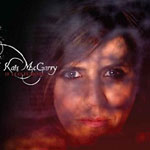
AAJ: You just mentioned pianist Fred Hersch. You're involved with his Pocket Orchestra?
JL: That's right. I'm a new member of the Fred Hersch Pocket Orchestra, which is a bass-less quartet. It's percussion, trumpet, voice and piano. The repertoire is comprised almost entirely of his compositions. It's a really interesting setting. I'm very attached to the bass, so it's an exciting challenge to be away from that foundation.
Fred has the widest range of any of us. He's above me and Ralph Alessi, who's on trumpet, and he's below me as well. He's providing the entire musical landscape. When it's Fred Hersch, that's just fine. Richie Barshay is on drums. We did a couple of nights at the Jazz Standard a few months ago, and that was a wonderful success. That will be recorded in the coming months on Palmetto.
AAJ: How did you meet Fred?
JL: I've known Fred for a few years. Fred is a wonderful supporter of vocalists, and he's very interested in new vocalists. He's always got his finger on the pulse of who's singing and who is pushing the limits in the jazz vocal realm. He's certainly not someone who feels that the jazz vocalist's role is to wear the nice dress and please the commercial customers. He's interested in the vocalist being an integrated member of the ensemble, for which there isn't much of a precedent. It's a challenge to figure out how to be less up front.
I met Fred through Kate McGarry, who is on his incredible Walt Whitman record Leaves of Grass (Palmetto, 2005). And he is on a couple of her albums, Mercy Streets (Palmetto, 2005), I believe, which features his composition, "Stars." We just kept bumping into each other, then one day he said, "Hey, let's get together and play." He sent me some of his songs, and little did I know it was an audition of sorts. I just thought it was some sort of session. It turned out to be an audition, and it turned out that I passed, so I'm in the project.
AAJ: It sounds like there must be an amazing amount of listening required to play in that group.
JL: There is. It's very challenging. I'm the most junior member of that group—not in age, but in experience. It was very challenging to do those four sets at the (Jazz) Standard. The amount of energy and concentration required to maintain that level of listening was something that I'm going to have to step up to. As a vocalist, you can get used to being expected to sit back and relax when it's not your solo. You sing the head and then you get out of the way. Whereas this is very, very intense.
It's a challenge that I'm excited to meet, but it's certainly quite a task. Fred's music is so intricate, and he has such strong and wonderful ideas of what he wants. That's one thing that is helpful. He may be very demanding—in a wonderful way—but he lovingly guides you through what he wants. He gives so much more than he expects. He expects a lot, but if you're prepared to go with it, he'll walk you through what you need to meet the challenge.
AAJ: As a vocalist, how do you find rewarding situations to put yourself in? Is it harder than for an instrumentalist?
JL: I think so. I've been very lucky so far. I got to play with Donny McCaslin in a new project, and also this project with Fred. It's something that is very dear to my heart, perhaps because I don't consider myself a composer. I suppose my dream job is as a sideman, because I love to be in somebody else's project, and for my job to be making their music sound great. But it's not very often that somebody wants a vocalist to do that.

Sometimes that's because [vocalists] steal the show, even if they don't want to. We're so ready to connect with a vocalist, because you have that instrument. You walk around and you use it all day. We all have a voice and connect very strongly to vocalists. So it's quite hard to not immediately gravitate toward that member of the group. If that's not the focus, and the music and the ensemble are meant to be the focus, it's a challenge to try to integrate a vocalist into the ensemble. I understand the reticence of some instrumentalists to do that, but I'm grateful that some do because it's what I love to do, perhaps most of all. Being in an ensemble is the greatest joy.
Selected Discography
Jo Lawry, I Want To Be Happy (Fleurieu, 2008)
Kate McGarry, If Less Is More ... Nothing Is Everything (Palmetto, 2008)
Tags
PREVIOUS / NEXT
Support All About Jazz
 All About Jazz has been a pillar of jazz since 1995, championing it as an art form and, more importantly, supporting the musicians who make it. Our enduring commitment has made "AAJ" one of the most culturally important websites of its kind, read by hundreds of thousands of fans, musicians and industry figures every month.
All About Jazz has been a pillar of jazz since 1995, championing it as an art form and, more importantly, supporting the musicians who make it. Our enduring commitment has made "AAJ" one of the most culturally important websites of its kind, read by hundreds of thousands of fans, musicians and industry figures every month.


